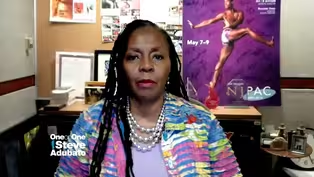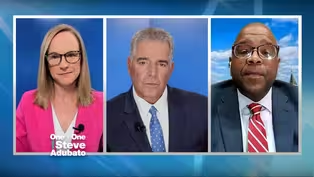One-on-One
Michele Adubato and the Philosophy of Leadership
Clip: Season 2024 Episode 2741 | 8m 44sVideo has Closed Captions
Michele Adubato and the Philosophy of Leadership
Steve Adubato talks with Michele Adubato, CEO of The North Ward Center and Founder of The Center for Autism, about the philosophy that everyone on a team must be a leader for an organization to thrive.
Problems playing video? | Closed Captioning Feedback
Problems playing video? | Closed Captioning Feedback
One-on-One is a local public television program presented by NJ PBS
One-on-One
Michele Adubato and the Philosophy of Leadership
Clip: Season 2024 Episode 2741 | 8m 44sVideo has Closed Captions
Steve Adubato talks with Michele Adubato, CEO of The North Ward Center and Founder of The Center for Autism, about the philosophy that everyone on a team must be a leader for an organization to thrive.
Problems playing video? | Closed Captioning Feedback
How to Watch One-on-One
One-on-One is available to stream on pbs.org and the free PBS App, available on iPhone, Apple TV, Android TV, Android smartphones, Amazon Fire TV, Amazon Fire Tablet, Roku, Samsung Smart TV, and Vizio.
Providing Support for PBS.org
Learn Moreabout PBS online sponsorship(upbeat music) - We're now joined by Michele Adubato, Chief Executive Officer of the North Ward Center, and the founder of the Center for Autism, my sister Michele.
Hey, how are we doing today?
- Hi.
Good.
- Why do you think it's so difficult for so many of us, and I'll say us, who create organizations, lead organizations, to create a succession plan that we are no longer the leader, that we have to hand the ball off?
Gotta take it, hand the...
I got a lot of props here, Michele.
You hand the ball off and you prepare people to take over.
You say?
- I say that as a founder of an organization, and yes, I run the North Ward Center and I'm proud to run the North Ward Center, but I founded the Center for Autism, and that's all I think, one of the major things I think about is what's gonna happen when I'm gone, is that you don't own it.
- Hold on, not only when you're gone, Michele.
Don't even just say when you're gone.
- When I'm done.
When this is- - Yes, go ahead.
- Whatever that looks like.
- Yes.
- It's not ours.
That's where I think people make a huge mistake, especially if they're nonprofits, or any business.
Who does it really belong to, okay?
And I look at it I guess the way other people look at it like it's mine, okay?
It's ours, okay?
I have a responsibility to make sure that the North Ward Center continues.
I have a responsibility to make sure that the Center for Autism is as strong as it was when I founded it.
And if I don't do that, I'm being irresponsible.
That's how I feel about it.
I'm irresponsible.
- But Michele, I'm gonna push back a little bit.
Everything you're saying makes perfect sense, and let me disclose the North Ward Center, a longtime underwriter of our programming, particularly in the field of autism awareness.
But let me try this.
The Caucus Educational Corporation our not-for-profit production company celebrating 30 years.
So, I created it with a bunch of people, right?
Some of whom not with us anymore, not working with us.
We have this great team.
How could I separate my stuff?
You said it's not for us.
I get it.
- Because you didn't create it on your own.
- Not at all.
- Okay?
You didn't.
No, you didn't.
- And it's not just- - Just like our father did not create the North Ward Center on his own, okay?
You were able to do this with the help of many people.
Yes, it was your initiative, just like it was my initiative to start the Center for Autism.
I absolutely could not have done that without the people that were around me.
And I think that's the key.
If we think- - Yeah, but Michele, hold on, I'm gonna push back on this way, in this way.
Everything you're saying makes perfect sense.
Logical.
It's rational.
But I'm dealing with the, to actually say, we separate ourselves and our ego, our self-esteem- - Yes, it's ego.
It's ego.
Maybe it's a guy thing.
I don't know.
- Oh, no, don't do that.
Seriously?
- (laughs) I'm just thinking.
- You think that's uniquely male?
- I think that when it comes to responsibility and when it comes to looking at certain organizations, and, again, I'm gonna look at it just from like a nonprofit standpoint, is that the fact of thinking that it's yours, it's not yours, okay?
It's not mine, okay?
There's a board of directors, there's funding that goes from, and there's guidelines with that funding.
And I honestly, you know, that's how I feel about it.
It's not mine.
Yes- - But you're personally invested.
- Yes, I leaned in to doing it.
I took that risk, okay?
And I said, "We're gonna do it."
You always need that person, you know, leading the charge.
But you said something in this really wonderful book, okay?
You know, and it says, you said about people, like, are everybody leaders, and it says, "I'm not going to wait until the boss tells me.
I'm gonna take initiative."
Those kind of people, if you have, you know, those people around you and you are able to do what you do, that's what makes success and that's how I founded the Center for Autism and how I continue to run the North Ward Center.
It's not mine.
I love it.
I love what I'm doing.
I'm so proud and I'm so honored to be doing it.
But I look at different people and go, "What about this person?
You know, how can I help this person?
Does this person fit into the future of our organization?"
That's something I think we absolutely have a responsibility.
- Do you think that a great organization can just have followers?
- Well, it all depends on how you define what a follower is.
I mean, I do think it's important to have, let's not use the word follower.
Let's use the word support team, okay?
I think a great organization has support teams and people who are supporting the organization.
And I do think that there has to be a level from the person that's running it to give license to other people to make decisions, to say, "I feel like whatever decision you're gonna make, I'm good with it."
And I think that's what's missing right now when it comes to leaders or, like, "Okay, I'm gonna make the decision, okay?
And this is how it's gonna go."
And I've really gone away from that in the past couple of years.
I'd say we've probably- - You've evolved as a leader in that way?
- I think I have.
I'm much more into saying to...
But it took a long time to get the people, you know, that are supposed to be here.
And I just ran, I'll give you an example.
I just ran a pretty big program for autism with Regina Belle.
There would be absolutely no way that I could have done that without my support team.
They ran it.
They ran everything.
- They led.
They led.
- And they made decisions.
They absolutely led.
So, they led in different ways, but they had it in their personality to do that.
You know, I don't know if you can teach it.
You can support it.
- Can you promote it and push it and encourage it?
- You can promote it and push it, but if the person, if the person keeps on saying, "Well, you know, I didn't know and I wasn't sure," and you have said over and over again to them, "But I'm giving you license to do this.
I want you to do this," and they don't do it, you gotta get them out.
My opinion.
- Out of the organization?
- 100%.
- We agree on this.
- Yeah, it's no help.
The reason why I'm doing as well, or the center, and then the Center for Autism, I have great, great people around, great leaders.
- Let me also say this to not just to Mary Gamba, but everyone on our team, you know who you are.
The credits will come up at the end of the show.
You don't just do your job, stay in your lane.
You step up, you speak up, you challenge, you lead, you question, "Hey, why don't we do this?
Why aren't we doing that?"
And that's what I said, not a mediocre team, but on a great team, everyone's gotta be a leader.
Hey, Michele, thank you for joining us, talking about leadership.
Good luck to you and the team at the North Ward Center and the Center for Autism.
Steve Adubato.
- Thank you.
- Michele Adubato.
We'll see you next time.
- [Narrator] One-On-One with Steve Adubato is a production of the Caucus Educational Corporation.
Celebrating 30 years in public broadcasting.
Funding has been provided by PSEG Foundation.
Newark Board of Education.
Robert Wood Johnson Foundation.
Horizon Blue Cross Blue Shield of New Jersey.
RWJBarnabas Health.
Let’s be healthy together.
The Port Authority of New York and New Jersey.
The Turrell Fund, a foundation serving children.
Wells Fargo.
And by The Fidelco Group.
Promotional support provided by NJ.Com.
And by BestofNJ.com.
(bright music) - Life is unpredictable.
Health insurance shouldn't be.
For over 90 years, Horizon Blue Cross Blue Shield of New Jersey has provided quality, affordable health plans to New Jersey residents.
We have served generations of New Jersey families and businesses and are committed to driving innovations that put you at the heart of everything we do.
Our members are our neighbors, our friends, and our families.
We're here when you need us most.
Horizon, proud to be New Jersey.
The Importance of Creating Diverse Programming at NJPAC
Video has Closed Captions
Clip: S2024 Ep2741 | 8m 57s | The Importance of Creating Diverse Programming at NJPAC (8m 57s)
Stanton Brown Talks Leadership & Innovation for Young Adults
Video has Closed Captions
Clip: S2024 Ep2741 | 10m 55s | Stanton Brown Talks Leadership & Innovation for Young Adults (10m 55s)
Providing Support for PBS.org
Learn Moreabout PBS online sponsorship
- News and Public Affairs

Top journalists deliver compelling original analysis of the hour's headlines.

- News and Public Affairs

FRONTLINE is investigative journalism that questions, explains and changes our world.












Support for PBS provided by:
One-on-One is a local public television program presented by NJ PBS

